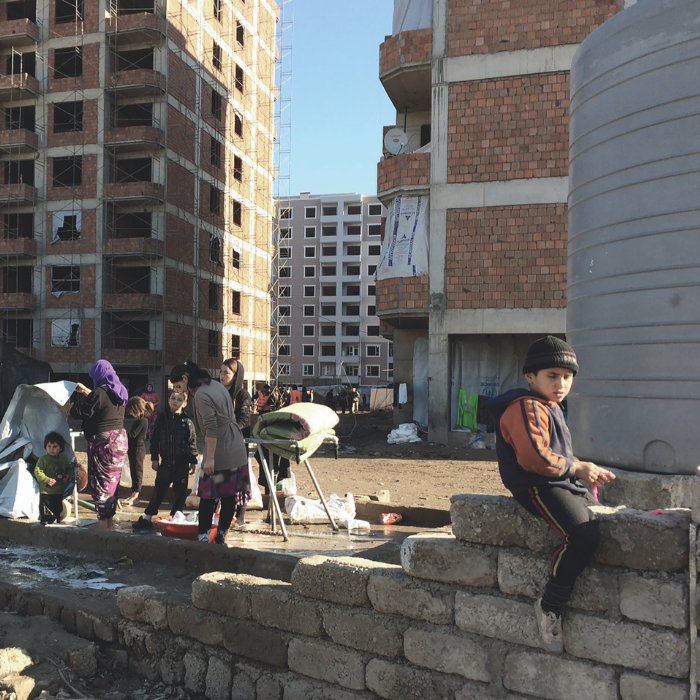The displacement situation in Iraq is overall extremely complex and dynamic. It is caused by a longstanding internal armed conflict, interventions from foreign actors inside the country and neighbouring Syria, and violence rooted in the country’s complex social, religious and ethnic fabric.
In particular, as a result of Iraq’s own crisis and events in neighbouring Syria, by 2016 the urban populations of some governorates in the Kurdistan Region of Iraq (KRI) has increased by as much as 30 per cent. This influx of internally displaced people and refugees came at a time when local communities’ resources were already strained by a pervasive economic crisis. Little was known, however, about the new arrivals living outside camps or the impact of their presence on the cities and communities hosting them. We have collaborated on the following profiling exercises:
Area-based urban profiling exercises in Erbil, Duhok and Sulaymaniyah Governorates in Iraqi Kurdistan (2015 – 2016)
In 2015-2016, we supported a series of collaborative urban profiling exercises to inform more comprehensive and evidence-based interventions in three governorates across the Kurdistan Region of Iraq:
The purpose of the profiling exercises was to generate missing evidence on the situation of refugees and IDPs living outside of camps in urban areas in one analysis in order to inform comprehensive responses for both groups and their neighbouring non-displaced communities.
Working with the governorate authorities in Erbil, Duhok and Sulaymaniyah, the Kurdistan Region Statistics Office (KRSO) and governorate statistical agencies and the Joint Crisis Coordination Centre (JCC) together with the UN Refugee Agency (UNHCR), UN Human Settlements Programme (UN-Habitat), the UN Office for the Coordination of Humanitarian Affairs (OCHA), the UN Population Fund (UNFPA) and the International Organisation for Migration (IOM), we helped shape an adaptable area-based methodology and advanced a capacity-sharing strategy through which to deliver our support.
The exercises combined quantitative and qualitative methods to explore the diversity within each target population group by different types of urban area. They looked at the similarities and differences between groups by location, including their capacities, vulnerabilities and coping mechanisms, and also examined the capacity of urban areas to absorb large numbers of IDPs and refugees.
Following the initiation of the profiling exercise by the Erbil Refugee Council (ERC) and UNHCR, a steering committee made up of ERC, JCC, KRSO, the Erbil Statistics Directorate (ESD), IOM, UNFPA, UNHCR, UN-Habitat and OCHA was set up to lead the exercise.
Through subsequent requests, support was then extended in November 2015 to support similar exercises in Duhok and Sulaymaniyah. Steering committees made up of the same partners and the local authorities and statistics offices of each governorate were set up, and a Technical Working Group (TWG) was also established in each governorate.
The profiling partners received support during all stages of the process and consolidated input from all partners to ensure a truly collaborative process, including:
The capacity shared among the profiling partners during the first exercise in Erbil meant that those in Duhok and Sulaymaniyah were able to be largely self-run with much of our support provided remotely. The methodology and tools for Erbil were developed in late 2015, and ESD conducted the household survey in December. The analysis workshop was held in February 2016 to discuss the initial survey findings, which in turn informed the methodology for qualitative data collection the following month. The household survey data for Duhok and Sulaymaniyah was collected in May 2016 and cleaned and analysed the following month.
The final profiling report for Erbil was launched in June 2016, followed by those for Duhok and Sulaymaniyah in November 2016. The results of the exercises were disseminated amongst the wider humanitarian and development community. The datasets from Erbil, Duhok and Sulaymaniyah can be downloaded from the Humanitarian Data Exchange (HDX).

The profiling exercises had a number of significant impacts in the three governorates:
Urban profiling in south and central Iraq (2015)
UNHCR and the Ministry of Displacement and Migration (MoDM) in Baghdad asked JIPS in March 2016 to provide remote support for a profiling exercise on IDPs and local communities spanning nine governorates. Due to limited access and challenging security situation in south and central Iraq, the profiling deployed a light methodology, aiming to provide initial household level data to inform overall planning of assistance provision.
We supported remotely the design of a methodology for a comparative profiling of host and displaced populations in the urban and peri-urban locations across south and central Iraq.
The data collection tools were jointly developed by MoDM and UNHCR with our technical advice, and MoDM undertook mobile data collection between May and October 2016. Surveys were conducted in the central governorates of Babylon, Karbala, Najaf and Wassit, and across Basra, Dhi Qar, Missan, Muthanna and Qadissiyah in the south.
The data collected from all nine governorates was cleaned and merged with the support from Statistics Norway, and the dataset is available on request via the HDX platform.
The impact of this profiling process was limited: the analytical report wasn’t finalised due to a shift in priorities in the country following the operation to retake the city of Mosul from Isis control in October 2016.
The data and in particular vulnerability analysis based on it was, however, used for UNHCR’s programme planning and implementation and, at the global, lessons learned from this have been shared with the targeting community.